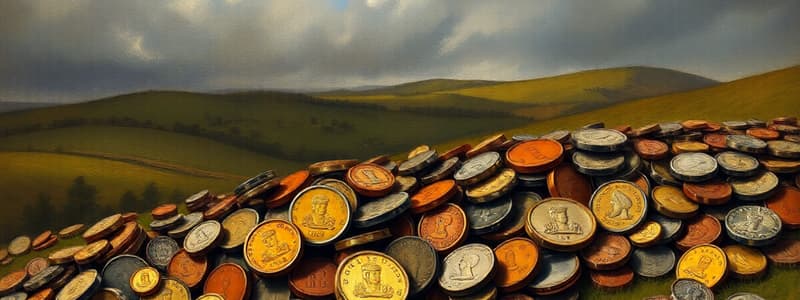Podcast
Questions and Answers
What is the most likely reason the silver coins were buried?
What is the most likely reason the silver coins were buried?
- The owners were trying to prevent them from being devalued.
- The owners were trying to hide them from invaders. (correct)
- The owners were saving them for a future purchase.
- The owners were trying to protect them from theft.
Based on the context of the article, how many Anglo-Saxon coins were found in the Chew Valley Hoard?
Based on the context of the article, how many Anglo-Saxon coins were found in the Chew Valley Hoard?
- 1,292 (correct)
- 2,584
- Cannot be determined from the text.
- 1,274
What is the estimated value of the Chew Valley Hoard in modern-day terms?
What is the estimated value of the Chew Valley Hoard in modern-day terms?
- The text does not provide a modern-day value. (correct)
- Approximately $10 million
- Approximately $2.7 million
- Approximately $5.5 million
What percentage of the total value of the Chew Valley Hoard will Adam Staples receive directly?
What percentage of the total value of the Chew Valley Hoard will Adam Staples receive directly?
Which of these is NOT true about the Chew Valley Hoard?
Which of these is NOT true about the Chew Valley Hoard?
What key event in English history does the Chew Valley Hoard represent?
What key event in English history does the Chew Valley Hoard represent?
If a coin from the Chew Valley Hoard features a depiction of King Harold II, it would suggest that it was minted before what year?
If a coin from the Chew Valley Hoard features a depiction of King Harold II, it would suggest that it was minted before what year?
What is the significance of some of the coins being cut in half, according to the text?
What is the significance of some of the coins being cut in half, according to the text?
Flashcards
Chew Valley Hoard
Chew Valley Hoard
A collection of 2,584 silver pennies from the 11th century found in Somerset, England.
11th century
11th century
The time period when the Chew Valley Hoard coins were minted, specifically between 1066 and 1068.
King Harold II
King Harold II
The last Anglo-Saxon king of England, depicted on half of the Chew Valley coins.
William I
William I
Signup and view all the flashcards
Norman Conquest
Norman Conquest
Signup and view all the flashcards
Half coins
Half coins
Signup and view all the flashcards
South West Heritage Trust
South West Heritage Trust
Signup and view all the flashcards
$5.5 million
$5.5 million
Signup and view all the flashcards
Study Notes
Discovery of the Chew Valley Hoard
- Metal detectorists discovered 2,584 silver coins in a farmer's field in Chew Valley, Somerset, England in January 2019.
- The coins date back to the 11th century (1066-1068).
- The coins were minted in 46 locations across England.
- The South West Heritage Trust purchased the coins for $5.5 million in October 2024.
- Coin finders will receive $800,000 as compensation.
- Landowner receives $2.8 million.
Historical Significance
- The coins' discovery coincides with the Norman Conquest of 1066.
- The conquest resulted in Harold II's death.
- William I reigned from 1066 to 1087.
- The coins show images of both King Harold and William.
Context of the Hoard
- The coins were likely buried for safekeeping.
- Possible reason for hiding - Exeter rebellions against William I in 1068.
- Return of Harold's exiled sons mounting attacks near Somerset.
- Coin cutting suggests practice of smaller currency units.
Value and Future of the Hoard
- The hoard was estimated to be worth the equivalent of 500 sheep or a large estate's annual income.
- The hoard will tour museums throughout the UK.
- The coins will be permanently housed at the South West Museum of Somerset.
Studying That Suits You
Use AI to generate personalized quizzes and flashcards to suit your learning preferences.





